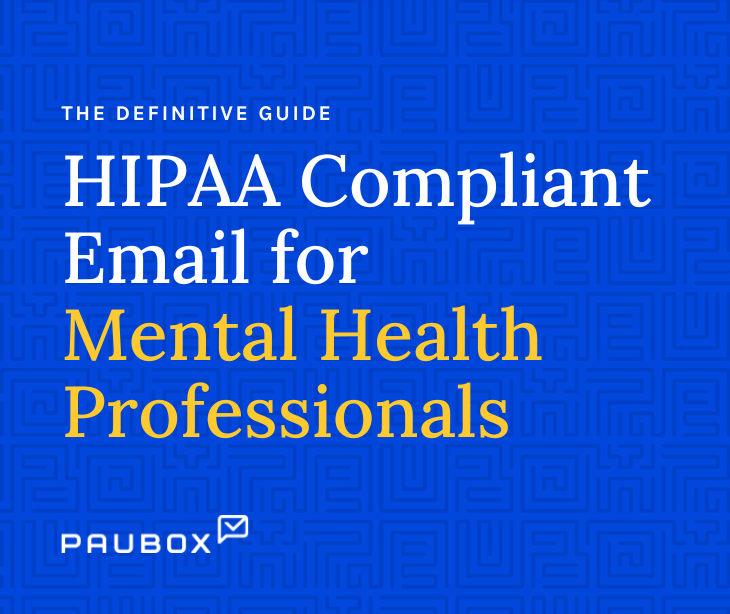
While telepsychiatry can bridge gaps in accessibility and convenience, psychiatrists must use HIPAA compliant emails to protect patient privacy.
What is telepsychiatry?
The American Psychiatric Association (APA) explains that “Telepsychiatry, a subset of telemedicine, can involve providing a range of services including psychiatric evaluations, therapy (individual therapy, group therapy, family therapy), patient education and medication management.”
Additionally, it increases “access to care by reducing barriers including needing transportation, child or care, or time off work” so patients can meet with their provider at their convenience.
Ensuring HIPAA compliance
While “telepsychiatry helps meet patients’ needs for convenient, affordable, and accessible mental health services,” providers must ensure HIPAA compliance.
More specifically, HIPAA compliant emailing platforms, like Paubox, offer encryption, authentication measures, and access controls to safeguard patients’ protected health information (PHI) from unauthorized access or potential data breaches.
Adhering to HIPAA standards helps providers protect patient privacy, promoting a trusting patient-provider relationship.
Improve access to mental health specialty care
Psychiatrists can use HIPAA compliant emails to reach patients regardless of geographical barriers, ensuring equitable access to quality mental health services.
For example, telepsychiatry services can be offered to individuals in rural areas who may not have easy access to mental health professionals in person, addressing mental health care disparities and providing support to those in need.
Bring care to the patient’s location
HIPAA compliant emails can bring care directly to the patient’s location, so psychiatrists can help patients manage their medication remotely. Patients can also report side effects or concerns through secure emails, allowing for timely adjustments to their treatment plan and improving overall mental health outcomes.
Integrate behavioral health care and primary care
HIPAA compliant emails can integrate behavioral health care with primary care, leading to better overall health outcomes. For example, a patient's primary care physician can securely communicate with their therapist to coordinate care and ensure all providers are informed of the patient's treatment plan.
Reduce trips to the emergency room
Psychiatrists can use HIPAA compliant emails for timely interventions and support, reducing unnecessary emergency room visits.
Read also: HIPAA and patient consent in emergency medical services (EMS)
Reduce delays in care
HIPAA compliant emails in telepsychiatry can reduce delays in accessing mental health care services so patients can schedule timely consultations, improving treatment outcomes.
Improve continuity of care and follow-up
Secure emails can enhance communication between patients and providers, ensuring ongoing support and follow-ups for managing chronic mental health conditions. For example, a patient can securely message their provider about medication side effects or changes in symptoms, allowing for timely adjustments to their treatment plan.
Additionally, secure emails can provide a convenient way for patients to ask questions or seek clarification on their mental health management strategies between appointments.
Minimize disruption to daily life
Email-based telepsychiatry is easily accessible and convenient, so patients can reply at their convenience without taking time off work or arranging childcare to attend in-person appointments.
Overcome transportation barriers
HIPAA compliant emails allow patients to receive care from the comfort of their homes, ensuring consistent access to mental health services.
For example, if a patient is unable to physically attend therapy sessions due to mobility issues or transportation barriers, HIPAA compliant emails provide a convenient alternative for communication with their healthcare provider.
Reduce stigma in accessing mental health care
HIPAA compliant emails offer discretion, allowing patients to individuals to seek help without fear of judgment. Furthermore, providers should tailor their emails to address the different types of stigmas, helping individuals overcome barriers to mental health care.
FAQs
Do psychiatrists need patient consent to send PHI in HIPAA compliant emails?
Yes, healthcare providers, including psychiatrists, must first obtain patients’ explicit authorization before emailing their PHI.
Go deeper: Patient consent: What you need to know
Do HIPAA compliant emails improve follow-up care?
Yes, psychiatrists can use HIPAA compliant emails to improve follow-up care. Specifically, these emails can include follow-up instructions, additional resources, and check-ins, ensuring continuous patient engagement and support.
Do HIPAA compliant emails help in appointment scheduling?
Yes, providers can use HIPAA compliant emails to send appointment confirmations, reminders, and rescheduling information, reducing no-shows and keeping patients engaged.
Subscribe to Paubox Weekly
Every Friday we'll bring you the most important news from Paubox. Our aim is to make you smarter, faster.



